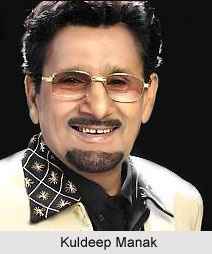 Kuldeep Manak, a popular Punjabi singer, and best known for singing songs of rare genre. He was popularly known for singing a rare genre of Punjabi music, Kali, called by its plural from kaliyan or kalian.
Kuldeep Manak, a popular Punjabi singer, and best known for singing songs of rare genre. He was popularly known for singing a rare genre of Punjabi music, Kali, called by its plural from kaliyan or kalian.
Early Life Of Kuldeep Manak
Kuldeep was born as Latif Muhammad in the year 1951 on 15th of November to father Nikka Khan in Bathinda district of East Punjab. He finished his matriculation from the village school, where he was very keen player of the game of Hockey. He had a special liking for songs and dance from a very young age and was often persuaded by the teachers to sing and dance on the stage.
Family of Kuldeep Manak
Nikka Khan - father of Kuldeep, was a singer by himself. Manak had two siblings: Siddqui, a devotional singer, and Rafiq, a tantric, who was also momentarily noted. Kuldeep Manak`s ancestors were actually Hazoori Raagis (designated cantors) of Kirtan for Maharaja Hira Singh of Nabha.
He got married to Sarabjeet and had two children, a daughter named Shakti and a son named Yudvir Manak. Presently, they both are married. Yudhvir is following in his father`s footsteps as a singer.
Career of Kuldeep Manak
Manak took music courses under the guidance of Ustad Khushi Muhammad Qawwal of Firozpur. He went to Ludhiana district after leaving Bathinda, to pursue career as a singer and also started singing wit the duo Seema and Harcharan Grewal. When they came to Delhi, it was actually a music company that officially spotted Manak and asked him to record the song Jija Akhian Na Maar Ve Main Kall Di Kurhi (written by Babu Singh Maan Mararawala) with Seema). In the year 1968, at the tender age of 17, he was also given the chance to record the song with Seema. His first record, along with laung karaa mittra, machhli paunge maape (written by Gurdev Singh Maan), featured this song. This particular record was actually a runaway success.
Later, he started an office at Bathinda along with writer Dilip Singh Sidhu of Kanakwal, but did not stay there for long and returned to Ludhiana. The first folk song sung by Manak was maa Mirze di boldi, followed by Ohne Maut Ne Waajan Maarian. The writer Hardev Dilgir, also called Dev Tharikewala, spotted Manak at one of his live performances and penned many Lok Gathavan (English: old folk stories) for him.
His first album, "Teri Khatar Heere", was released by HMV in 1973 which included the 4 songs Jaimal Phatta, Teri Khatar Heere, Raja Rasaloo and Dulleya Ve Tokra Chukayeen Aanke. His second album released as a Super-7 vinyl was called `Punjab Diyan Lok Gathavan`, and contained Gorakh da Tilla. In 1976 his first LP, Ik Tara, was released including the kali Tere Tille Ton, Chheti Kar Sarwan Bachcha and Garh Mughlane Dian Naaran and more. Further albums included "Sahiban Da Tarla" (1978), "Sahiban Bani Bharaawan Di" (1978), "Maa Hundhi Ae Maa" (1980), "Akhan ch Najaiz Vikdi", "Ichhran Dhaahan Maardi", "Jugni Yaaran Di" (1983) and "Do Gabhru Punjab De". Manak`s voice was versatile as within one album he sang in many different pitches and tones to reflect a song`s meaning. For example in the album "Sahiban da Tarla" the songs Sahiban da Tarla, Yaari Yaaran di and Teri aan ma Teri Ranjha are all sang with different pitches.
In 2012, Manak was featured in an album by Kalikwest, released on February 10, 2012, along with Bhinda Jatt, Sukhwinder Panchhi, Manjeet Pappu, Sukhdev Sukha, Inder Kooner, and Harleen Kaur.
Stint in Films for Kuldeep Manak
He also acted and sung in many Punjabi films like "Saidan Jogan" (1979) with the song, Sathon Naee Majhin Chaar Hundian, "Lambardaarni" (1980) with Yaaran Da Truck Balliye (song), and Balbiro Bhabi (1981) as actor, singer and composer. He also sung a song, "Ajj Dhee Ik Raje Di", in the 1983 film Sassi Punnu. Manak also took part in the parliament elections for Lok Sabha candidature of 1996 as an independent member from Bathinda but did not win.
Manak was, for a long time, battling kidney disease. He died on 30th November 2011 due to severe case of Pneumonia lung infection, at the DMC Hospital in Ludhiana. He was 62 years old. His burial took place at village Jalal in Bathinda. His Last album was Maharajas in which he sang 2 songs with both Jazzy B and Yudhveer Manak and 4 songs only with Jazzy B




















